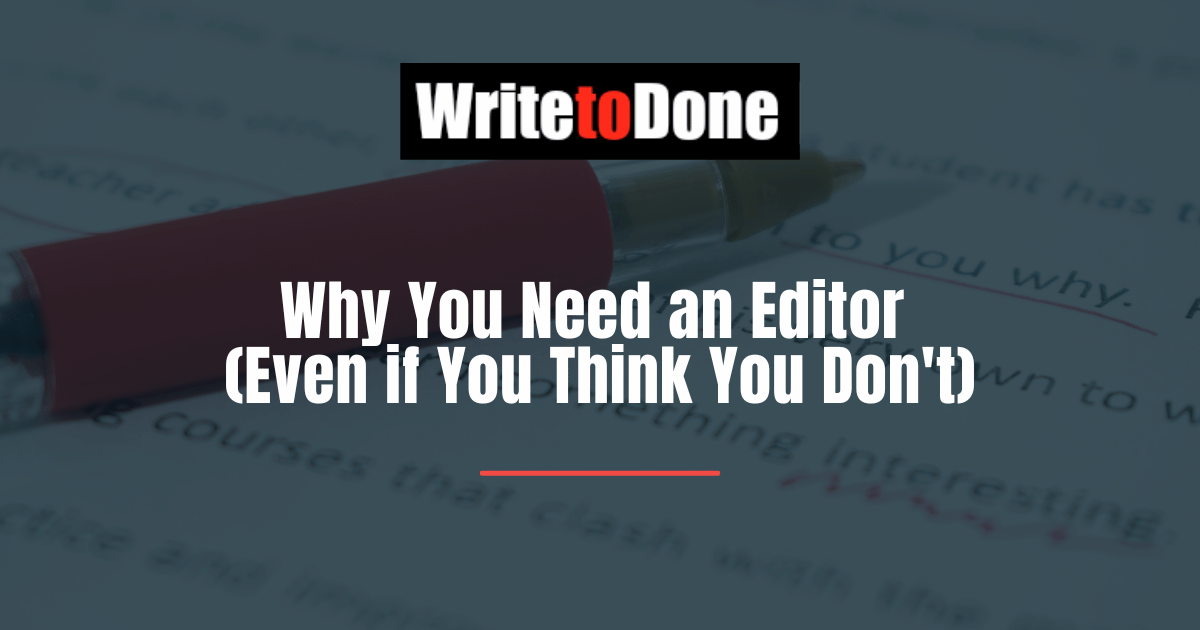Whatever you think, you need an editor.
There comes a time in every writer’s life when the plot is adequately twisted, the characters are adequately developed, and all the typos have been eliminated with a laser gun. You think.
Actually, you’re not sure if any of that is true because you’ve been staring at the same document on your computer for so long you’re kind of wondering if maybe you didn’t go blind last week. You think you’re reading words. You think those words are good. The dreams about your story have stopped and now all you dream about is book parties and signings and big wigs and wine.
You think you’re ready to submit. To publish. To throw caution to the wind and send that manuscript off for some close reading. Except you haven’t been able to read your own manuscript closely for months now and you’re honestly not sure what it says anymore. Your characters could be marrying dogs or lost somewhere else in the muddle, you have no idea.
That’s why you need an editor.
Someone who doesn’t know you or love you but knows writing and loves reading freshly pressed work. Someone who will look at your characters and say, “Hey, cool story, but did you notice Sally marries a dog on page 23?”
When I receive a manuscript to read, I welcome it with open arms. And the brave writers who have sent their words to me wait patiently in the background brimming with nervous energy. It’s a great relationship. We email back and forth about little things. We laugh. I read and make notes.
And then I send the editorial letter. And that’s when the fun stops.
Right there, in one convenient document, is an overview of all the concerns I have regarding their manuscript. Plot holes, flat characters, lagging prose, over-telling, over-explaining, back story — all of it. Their manuscript is suddenly less pristine and more of a mess and I know I’m not gonna be the one to clean it up.
Receiving an editorial letter after you’ve paid to have your novel edited sucks. It just — sucks. That’s pretty much the only thing I can say. But! That same editorial letter that sucks so much to read is also the heart and soul of what you paid for. You asked someone professional with an objective eye to read your manuscript and deconstruct it — and that’s exactly what they did. And they even went one step further and gave you suggestions on how to clean up your mess.
Still, I can hear it through the email; the writer’s happiness just deflates. I receive an answer just dripping with defeat. But it doesn’t have to be that way. Steel your skin and prepare your mind before you open that letter. And remember these things:
1. What is a Finished Piece to You is a Rough Draft to Me
You may believe your manuscript to be finished and polished — but if you’re sending it to an editor, it’s not. Why else would it end up on an editor’s desk? There are things going on in your manuscript that you are simply blind to because you no longer have the distance and objectivity to see it. Why would you? You’ve spent months with your nose to the screen trying to figure out how to finish this thing.
2. Just Because You Receive In-Depth Edits Doesn’t Mean You Suck
Everyone receives in-depth edits. Everyone receives suggestions for change. Everyone has to get edited. I, too, am a writer. And my critique group always makes suggestions for changes. They even tell me ::gasp:: that something is not working. And I get sad. I go home. I take a nap. And then I rewrite.
3. By All Means, Get Angry — Just Don’t Call Me
When you receive edits and they seem overwhelming, you’re going to get angry. And you’re probably going to be angry at me. That’s the nature of the beast. So get angry. But remember that it’s not me you’re angry with. Frankly, you’re upset with yourself because you sent something that you thought was ready to go and it turned out to not be so ready after all. And that’s okay, really. It’s human nature to get upset when things are hard and writing is just that. So read your letter, take a few deep breaths, hit a punching bag, and take a nap. Seriously. Naps fix everything. When your emotions are defused and you’re ready to get back to work, then you can email me.
4. I’m Not Here to Make You Feel Bad
My job is to make your writing better, and by default, make you a stronger person. My job is not to take your money and rip your work to shreds. It is not in my interest to be snarky and make you feel like shit. I don’t want to make you give up.
I want to make your writing better. I want to make your writing better. I want to make your writing better.
That’s the first and last concern on any editor’s mind when we read your work.
















